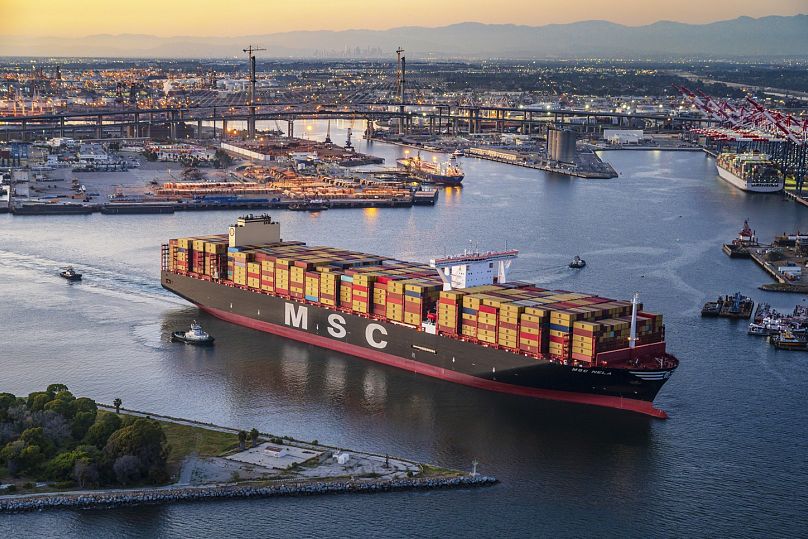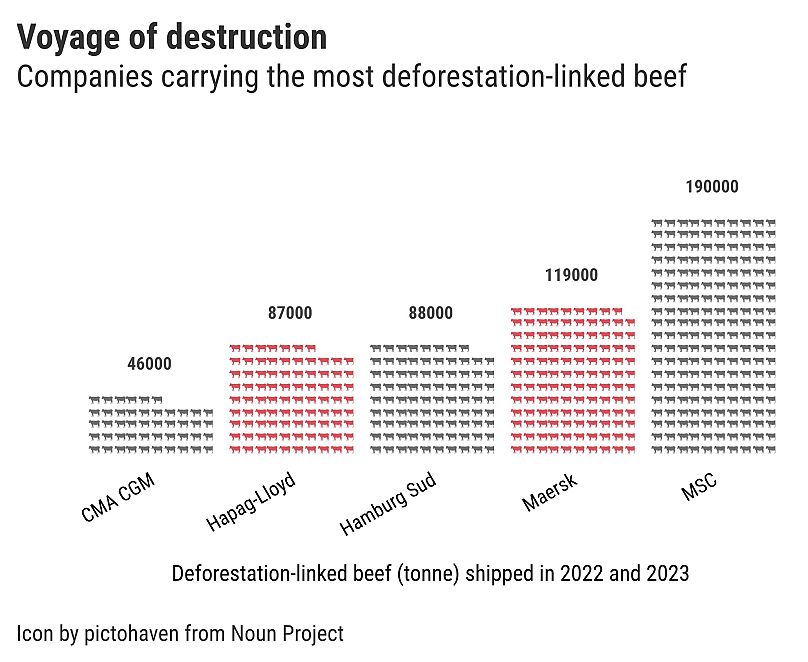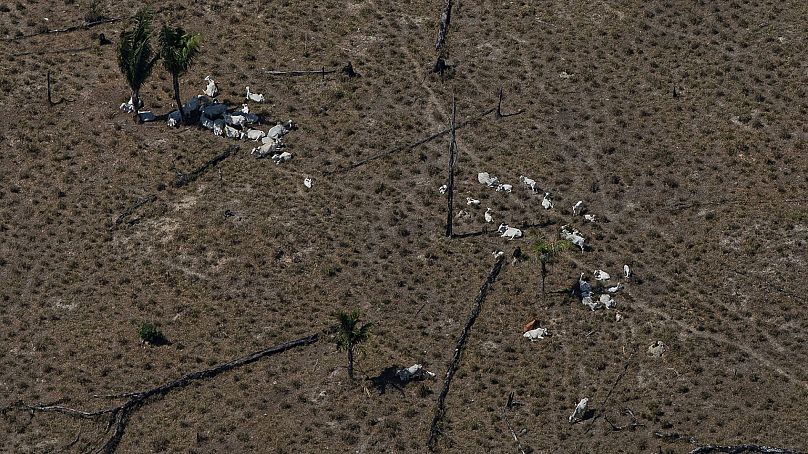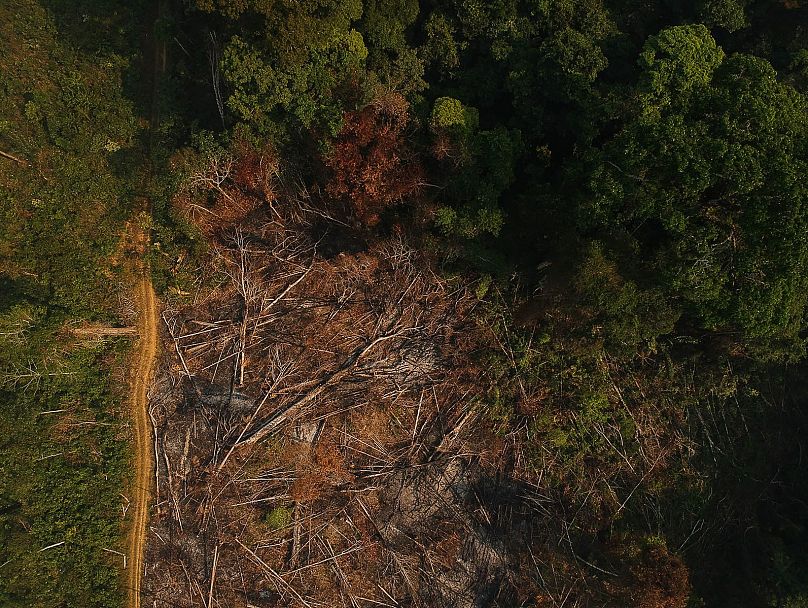‘Silent enablers’: The European shipping companies moving deforestation-linked beef around the world
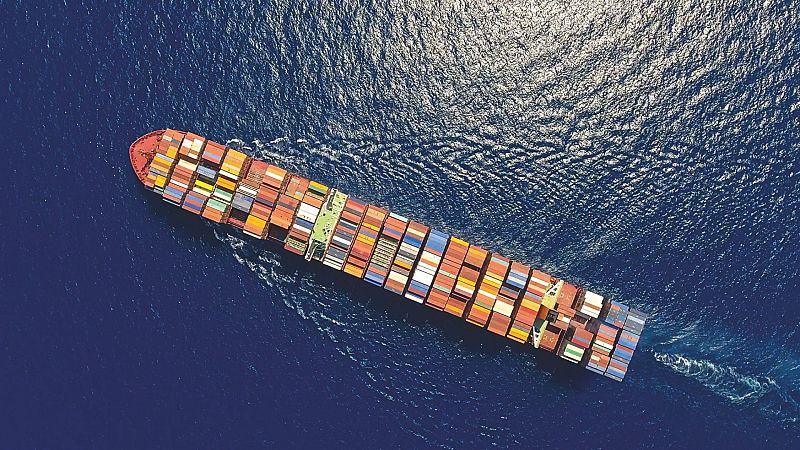
Global demand for beef continues to drive the destruction of the Amazon rainforest, as farmers clear land for grazing space. But the meat would never make it out of Brazil were it not for the behemoths of the shipping world transporting it to our supermarket shelves.
New research by The Bureau of Investigative Journalism uncovered the shipping companies responsible for moving deforestation-linked beef products around the world. It found more than half a million tonnes of beef and leather that came from Brazilian abattoirs linked to deforestation had been shipped out in just two years.
Most shipping companies have policies in place to prevent the movement of certain goods. Often, these apply to illegally felled timber or wildlife being trafficked and are in line with international regulations. But a lack of any rules or restrictions on beef and leather from deforested land means no questions are asked about the origins of the products.
The shipping companies aiding deforestation
Data from consultancy AidEnvironment shows that, between August 2021 and July 2023, the loss of 4,600 square kilometres of forest could be traced to just 12 meat processing plants. These 12 plants are run by Brazil’s three biggest beef companies - JBS, Minerva, and Marfrig.
Some of Europe’s largest shipping companies, including Hapag-Lloyd, CGM-CMA, Maersk, and MSC, transported more than half a million tonnes of products from these abattoirs in hundreds of consignments over the two year period.
“Major shipping companies are the silent enablers in the billion-dollar global trade of deforestation-risk commodities like beef and leather,” said Alex Wijeratna, senior director at campaign group Mighty Earth. “But they slip under the radar when it comes to legal accountability.”
MSC, Maersk and Hapag-Lloyd responsible for shipping the most beef and leather
In terms of the worst offenders, TBIJ identified the biggest shipper as the Mediterranean Shipping Company (MSC), which it says moved almost 190,000 tonnes of beef and leather.
Maersk carried the second largest shipments at over 119,000 tonnes, while Hamburg Sud and Hapag-Lloyd shipped over 85,000 tonnes each. CMA CGM shipped around 46,000 tonnes.
“It’s not just those who wield the chainsaws who should be held responsible for destroying forests,” says Nicole Polsterer, from the campaign group Fern. “Every link in supply chains which profit from tainted goods should be legally accountable for them.”
When asked about the lack of internal policies on shipping animal products, CMA CGM told TBIJ it was developing new procedures and would inform its customers to ensure compliance with upcoming regulations. The three Brazilian beef companies all denied their products came from deforested areas.
Deforestation regulation delay exacerbates the problem
Deforestation is a global problem but is particularly acute in the tropics. The World Resources Institute estimates that the world loses 10 million hectares of forest - an area the size of Portugal - every year, with 96 per cent of deforestation taking place in tropical forests.
The World Wildlife Fund (WWF) states that 17 per cent of the Amazon rainforest has already been lost, and a further 17 per cent has been degraded due to human activity.
The beef industry is responsible for almost half of all deforestation, as livestock farmers need to clear substantial areas of pasture for cattle to keep up with the global demand for meat.
Over 80,000 square miles (208,000 sq. km) of forest are lost every year for meat production, 80 per cent of which takes place in the Amazon.
A first-of-its-kind EU Deforestation Regulation (EUDR) aims to take steps to counter this and was hailed as one of the union’s boldest actions to mitigate the climate crisis when it was announced.
The regulation would require all EU importers of products like beef, leather, soy and palm oil to prove their supply chain is not contributing to logging anywhere in the world. Failure to comply would mean fines of as much as four per cent of the company’s turnover.
The regulation came into force in June 2023, and was due to be implemented in the EU by the end of 2024. However, earlier this month, on December 3, following complaints from countries both within and outside the EU, the European Commission agreed to delay the implementation by 12 months.
In a statement, the Council of the EU said the delay was to, “give legal certainty, predictability and sufficient time for the smooth and effective implementation of the rules, including fully establishing due diligence systems that cover all relevant commodities and products.”
The new regulation won’t affect shippers directly as they are not the buyers of the products. However, they will be essential in implementing due diligence, according to Marie Toussaint MEP, who worked on the EU legislation.
However, another piece of EU legislation could see more onus placed on entitles like shipping companies. The Directive on Corporate Sustainability Due Diligence came into force in July 2024, and requires companies in scope to identify and address adverse human rights and environmental impacts of their actions inside and outside Europe.
Although this legislation will not be implemented until July 2026, it's a more far-reaching directive than the EUDR, and could shine a spotlight on the ‘silent enablers’ in supply chains.
Yesterday


